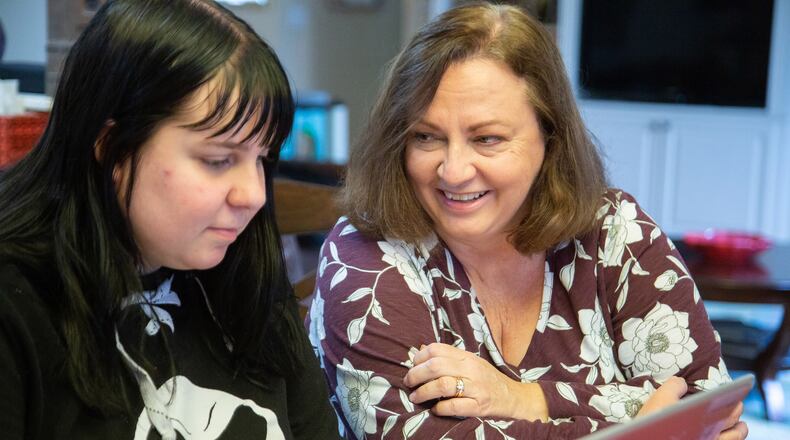Stephanie Fuhrmannek taught at Puckett’s Mill Elementary School in Gwinnett County before she decided to be a stay-at-home mom. Still certified, she spent five more years at Puckett’s Mill as a sought-after substitute teacher.
Then came the coronavirus pandemic.
Fuhrmannek, who is 55 and has asthma, worried that bouncing between classrooms as a substitute teacher would increase her risk of exposure to the virus.
“I just told them that I was not going to go into the building until I had a vaccine,” she said. “I don’t think I’m in the highest risk of dying, but I don’t want to take that chance.”
A national pandemic-related shortage of substitute teachers is hitting home in metro Atlanta as teacher absences increase for quarantine and other health reasons, while fewer substitutes are willing to risk taking their places in classrooms.
Substitute teachers could be hard to find even before the coronavirus pandemic, but the scarcity worsened in school districts that opened this fall.
In Gwinnett County, the state’s largest district, about 12,000 teachers have been working from their classrooms, teaching in person and digitally at the same time. Historically, the school district has found substitutes to cover more than 90% of teacher absences.
But in the fall semester, subs only filled in 67% of the time, according to data from the human resources department. The school district has about 2,000 active substitutes this school year, compared to 3,000 the year before, the data shows.
Fulton County Schools only had 45% of the substitute teachers the district needed in November, Superintendent Mike Looney told the school board recently. About six teachers per day have been absent from many schools, and the district closed some campuses because of the number of staff quarantining, according to Looney’s presentation.
The Cobb County School District found substitutes to cover classes almost 76% of the time in 2019, but that rate dropped this academic year to 69%, according to data provided in response to an open records request.
A nationwide substitute teacher shortage was already happening before the pandemic, driven largely by an exodus of baby boomer aged teachers reaching retirement while fewer college graduates enter the profession.
Now, some potential substitutes prefer drawing unemployment to the risk of entering a classroom, especially if the pay for subs is not much higher, said Nicola Soares, president of Kelly Education, an agency that staffs substitutes in 40 states including parts of Georgia.
“The pandemic has sort of exacerbated the whole issue,” Soares said. “The challenge has been having people to accept assignments consistently.”
In a national survey, conducted in November by the EdWeek Research Center, more than half of principals and district leaders said they were covering a lower percentage of teacher absences with substitutes than in fall 2019.
In Gwinnett, some high-risk teachers have taken medical leave to stay out of the classroom and about 20 more teachers resigned compared to last year’s fall semester, said Monica Batiste, associate superintendent of human resources.
Schools have resorted to using other employees, such as instructional coaches or clerks, as substitutes for teachers or paraprofessionals. Sometimes classes have been merged together in larger rooms to allow for social distancing, teachers and administrators said.
Many substitutes are retired teachers whose age puts them at greater risk of serious illness from COVID-19, Batiste said. Because they don’t get health insurance benefits from the school district, potential subs also worry about the medical bills a case of the virus could generate.
Some have told administrators they’re too busy at home with children who are learning remotely, while others are uncomfortable with hybrid digital teaching.
Alicia Eriksen has been a substitute at Dowell and Cheatham Hill Elementary Schools in Cobb County for about eight years. But last summer, in response to a survey from the county, Eriksen said she was done for the time being.
Eriksen is 60 years old and has a pre-existing medical condition, but said her decision was not based on fear of catching COVID-19.
“I could not wear a mask all day,” she said in an email to the AJC. “Also I explained that I did not want to be responsible for keeping a bunch of elementary school kids separated from each other all day long.”
Eriksen said she’d consider coming back when classrooms return to normal. “I did like my job,” she said.
School districts have responded to the scramble for substitutes by raising pay rates.
The Fulton County Board of Education in November approved a temporary pay incentive that the district’s chief talent officer said will cost taxpayers about $600,000.
The daily pay rate for a paraprofessional/clinic/clerical substitute was increased from $80 to $100. Substitute teacher daily rates went from $100 to $175. Long-term substitute teacher pay was upped from $120 to $200 daily.
Fulton schools will also pay a one-time incentive of $75 to substitute teachers quarantining as a result of direct contact with a positive COVID-19 student/staff while subbing on a Fulton campus. The district’s substitute teachers can also now work 20 days each month as opposed to 17 days.
The incentives end May 31.
Gwinnett increased its rate by $5, to $98 per day for short-term subs and $108 per day for long-term subs. The district is also paying $120 per day to about 140 substitutes who are on call Mondays and Fridays, when more teachers are absent.
Gwinnett provided professional development on teaching digitally from the classroom and reached out to former subs who listed themselves as inactive this semester to discuss safety concerns, Batiste said. The district has held virtual job fairs and opened computer labs for prospective substitutes to apply and ask questions.
Still coming up short, the district last month lowered the education requirement for substitutes from 60 college credits to a high school diploma, allowing college education majors who are freshmen and sophomores to apply.
DeKalb County School District has remained fully virtual. But during the pandemic, some substitute teachers were unable to work because the district did not provide access to the website where substitutes can offer their services, said Deborah Jones of the Organization of DeKalb Educators.
“If you’re bringing the children back and you don’t have the people to teach the children, then what is your plan?” Jones said.
Atlanta Public Schools, which plans to reopen buildings later this month, learned from other districts that teacher call-outs were becoming an issue, spokesman Seth Coleman said. APS is hiring more substitutes and changing its model to place permanent subs at each school at the district’s highest rates: $140 per day or $200 for those with special education certification.
For love or money, thousands of subs in metro Atlanta have continued taking assignments. For 80-year-old Carol Rhoades, it’s love.
Rhoades taught home economics at Milton High School in Fulton County before retiring with a pension. When she walked into Milton in the fall to continue her 12-year subbing streak, teachers asked what she was doing.
“You get to the point where there are some risks you have to take,” Rhoades said. “I’m blessed with good health at this age and it energizes me to be around energy, as those kids have.”
Staff writers Vanessa McCray and Wilborn P. Nobles III contributed to this report.
Keep Reading
The Latest
Featured




